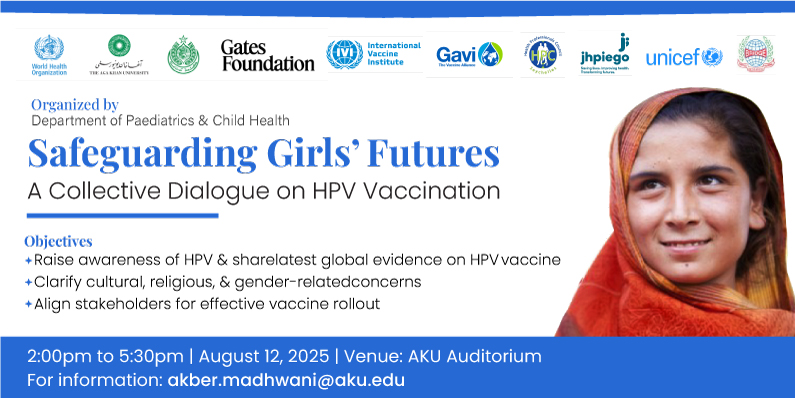The Department of Paediatrics and Child Health is among the first research teams in Pakistan to collect data on the cancers caused by the Human papillomavirus or HPV. This data can inform critical policy-making decisions for the HPV vaccine, which can prevent the cancers it causes.
We will be conducting a prevalence and incidence study in women from urban and rural settings of Sindh, Pakistan. This project is critical as the results will provide the basis of possible induction of the HPV vaccine in the national immunization program. This, in turn, will help save the lives of thousands of women through the prevention of cervical cancer.

What is HPV?
Human papillomavirus, or HPV, is a very common virus with over 150 types. It spreads through sexual contact. There are two kinds of HPV: high-risk and low-risk. High-risk HPV can lead to serious diseases like cancer of the cervix (the lower part of the uterus), anus, and other areas. The most dangerous types are HPV 16 and 18. Low-risk HPV doesn't cause cancer but can lead to less serious issues like genital warts.
It is estimated that over 80% of sexually active people will acquire HPV at some point in their life and prevalence of HPV infection varies depending on factors such as age, gender, sexual behavior, and geography.
The global burden of HPV-associated cancers is rising, particularly in low- and middle-income countries (LMICs). Asia has more than 1,700 million women aged 15 years and older who are at potential risk of developing cervical cancer. Current estimates indicate that every year more than 350,000 women are diagnosed with cervical cancer and almost 200,000 die from the disease, ranking cervical cancer as the 4th most frequent cancer among women in Asia. While cervical cancer incidence rates are declining in high-income countries, there is an increasing trend in low- and lower middle-income countries, with the highest rates in East and West Africa.
How widespread is HPV in Pakistan?
According to the Human Papillomavirus and Related Cancers, Fact Sheet 2023, recent estimates indicate that every year in Pakistan, 5,008 women are diagnosed with cervical cancer and 3,197 die from the disease. Cervical cancer ranks as the 3rd most frequent cancer among women in Pakistan and the 2nd most frequent cancer among women between 15 and 44 years of age. About 0.5% of women in the general population are estimated to harbour cervical HPV-16/18 infection at a given time, and 88.1% of invasive cervical cancers are attributed to HPVs 16 or 18.
The
Human Papillomavirus and Related Diseases Report in Pakistan 2023 states that there are no official national recommendations for cervical cancer screening or prevention strategies, such as HPV vaccination and immunization program in Pakistan. However, the Government of Pakistan Ministry of Health, along with other stakeholders, including NGOs, physicians, women and gender-based organizations, educators, civil society organizations and development partners are showing growing interest in the HPV vaccine and its addition it in the current EPI program.
The study is funded by the International Vaccine Institute and is sponsored by the Aga Khan University.
Who is the population in our study?
This study is going to be conducted at two sites i.e., urban and rural. The urban site will be in Karachi, and the rural will be Dadu. In Karachi, the study will be conducted in four communities, namely Rehri Goth, Bhains Colony, Ibrahim Hyderi and Ali Akber Shah. These are impoverished coastal villages with a population of approximately 350,000 residents based on the census conducted in 2023.
The population is multi-ethnic, with Sindhhi, Pashtun, Punjabi, Bengali, and Urdu-speaking communities. We are aware of the cultural diversity in these four sites through the extensive work that we (Aga Khan University, specifically, Department of Paediatrics) has done here over the last two decades.
Our study in Dadu will be done in Taluka 2, which includes 15 Union Councils, comprising a diverse population within rural Sindh.
Is the HPV vaccine available in Pakistan?
Two globally licensed HPV vaccines have been introduced in Pakistan: a quadrivalent vaccine Gardasil (marketed by Merck, Pakistan) and a bivalent vaccine Cervarix (marketed by GlaxoSmithKline, Pakistan). Gardasil is protective against the HPV serotypes 6, 11, 16, and 18, providing protection against both cervical cancer and genital warts. On the other hand, Cervarix is effective against serotypes 16 and 18, thereby protecting only against cervical cancer.
The data we collect in this study is critical to inform policies, that may expedite the induction of the HPV vaccine into the EPI program of Pakistan. Through this program, the cost of HPV vaccine will be significantly reduced for the general population.
Who can get the HPV vaccine and when?
The WHO has issued guidelines:
- A one or two-dose schedule for girls aged 9-14 years
- A one or two-dose schedule for girls and women aged 15-20 years
Two doses with a 6-month interval for women older than 21 years
The age group targeted for primary series of the HPV vaccine is 9-14 years old. The age group targeted for a multi-age cohort catch-up campaign is 15-20 years old.
The age group that is anticipated to have the highest incidence is newly married girls and women of reproductive age. The youngest recommended age is 9 years for a girl to receive the vaccine. The HPV vaccination is not recommended for women older than 26 years of age by the CDC.
How much does the HPV vaccine cost?
One of the major reasons for poor uptake of the HPV vaccine is the lack of affordability. The Cervarix vaccine by GlaxoSmithKline costs around 5,000 PKR (US$ 22) in Pakistan, which is why the majority of the general population cannot afford it.
Where do I go if I want to get the HPV vaccine?
Cervarix and Gardasil are available at major pharmacies and online pharmacies (such as dawaai.com). However, the supply is very limited and not available in many parts of Pakistan. You have to ask your gynaecologist for information and counselling.
Text by Aneela Pasha
MSc Epidemiology & Biostatistics
Instructor, Research
Department of Paediatrics and Child Health


